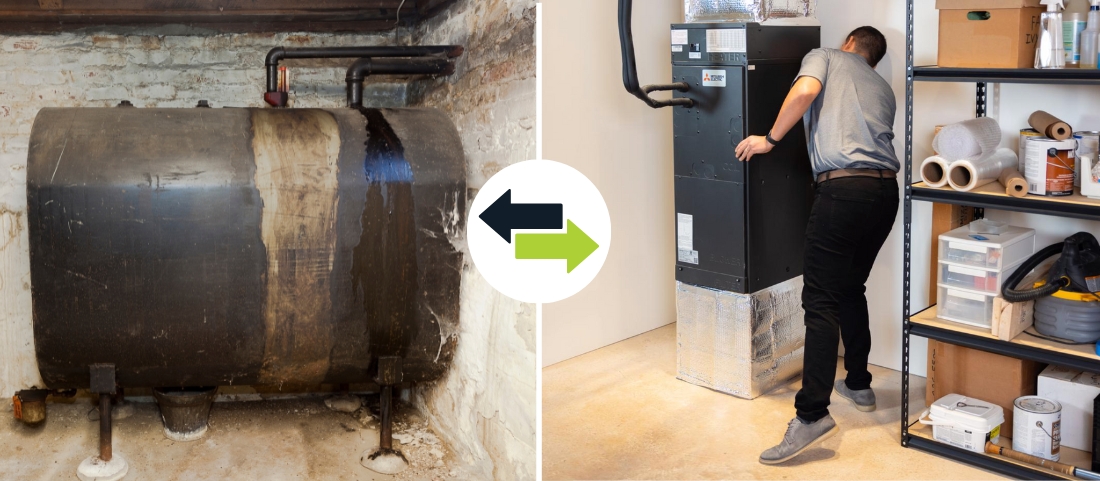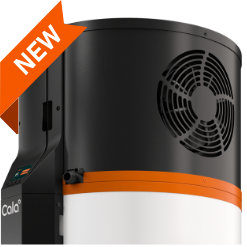Oil to Heat Pump Conversion | Lexington, MA
Oil to heat pump conversion is the process of replacing an outdated oil furnace or boiler with an energy-efficient electric heat pump to lower your energy bills and improve home comfort. If you're in Lexington, MA and looking to replace your oil furnace with a heat pump, our expert team delivers fast, reliable installation with long-term savings and enhanced performance.

Why Oil to Heat Pump Conversions Are Growing in Lexington, MA
As the seasons shift in Lexington, MA, homeowners are increasingly seeking more efficient and environmentally conscious ways to heat and cool their homes. For decades, many properties in this historic town have relied on oil-fired systems. However, rising fuel prices, strict emission standards, and a growing interest in sustainable living have prompted a shift toward heat pump technology.
With incentives from Mass Save®, local climate compatibility, and the promise of significant energy savings, it's no wonder that switching from oil to a heat pump is becoming the smart choice for Lexington residents aiming to modernize their homes.
“In towns like Lexington, where winter temperatures drop well below freezing, properly sized heat pumps now outperform oil systems in both efficiency and comfort — and they’re much cleaner too.” — Sustainable Heating Alliance
Oil to Heat Pump: A Smart Heating Upgrade in Lexington
Upgrading from oil to heat pump systems is a transformative improvement for many Lexington homes. Not only does it future-proof your property, but it also offers numerous performance, environmental, and financial benefits.
Why Heat Pumps Work Well in Lexington's Climate
Heat pumps are no longer reserved for mild weather states. Today’s cold-climate air-source heat pumps are engineered to function efficiently even when winter temperatures dip below 5°F—a common scenario in Lexington, MA. Whether you’re heating a mid-century colonial in Follen Heights or a cape-style home near Lexington Center, these systems provide reliable warmth.
Unlike oil systems, which can overheat spaces and lead to uneven temperatures, heat pumps deliver consistent comfort by adjusting their output based on demand. This creates a more balanced and energy-efficient home.
Replace Oil with a Cleaner Alternative
Upgrading from an oil-burning system to an electric heat pump means switching to a significantly cleaner alternative. Oil heat generates harmful emissions and increases your home’s carbon output.
Heat pumps, by contrast, produce no on-site carbon emissions, especially when paired with renewable electricity. With this transition, Lexington homeowners can make a meaningful change toward helping Massachusetts meet its ambitious climate goals.
“Replacing oil heating with electric heat pumps could reduce residential carbon emissions by up to 50% statewide.” — Massachusetts Department of Energy Resources
Benefits That Go Beyond the Furnace Room
Converting your oil system to a heat pump typically means:
- Eliminating oil deliveries and bulky fuel storage tanks
- Lowering annual utility bills through better energy savings
- Accessing year-round heating and cooling from a single system
- Improving indoor air quality with no combustion byproducts
Oil Boiler to Heat Pump: How to Transition Effectively
Older oil boiler systems are common in Lexington, especially in homes built before 1970. Upgrading these systems to heat pumps doesn’t have to be overwhelming—you just need a structured plan.
Assessing Your Current System
Start by identifying your home’s current heating infrastructure. Does your oil system heat via baseboards or radiators? Is there existing ductwork? These play a role in how your heat pump installation is designed.
Most oil boilers with hot water distribution can be retrofitted with ductless mini-split heat pumps or configured with high-performance fan coils. Split-system heat pumps are ideal for Lexington homes lacking air ducts but needing zonal comfort and flexible installs.
Choosing the Right Heat Pump Technology
When converting from an oil boiler, it's essential to choose a product rated for cold climates. Look for units certified by the Northeast Energy Efficiency Partnerships (NEEP) and listed in the Cold Climate Air-Source Heat Pump Specification.
Priority should be given to models with variable speed compressors, which allow for smooth, efficient operation across a wide range of outdoor temperatures.
We size the systems based on local climate data, insulation levels, and actual heat load—not just square footage—ensuring optimal performance even during Lexington’s coldest weeks.
Ducted vs. Ductless Options
Depending on your home layout and existing infrastructure, you may need:
- Ductless mini-split systems for older homes or additions
- Central ducted systems for newer homes with existing ducts
- Hybrid installations combining both, for targeted upgrades
All of these configurations bring you the same core benefits: quieter operation, better comfort control, and reduced fuel use from no fossil fuels.
“Lexington homes built in the 1940s and 1950s are excellent candidates for ductless mini-split heat pump systems—they deliver comfort without dismantling historical charm.” — Greater Boston Home Sustainability Workshop
Replace Oil Furnace with Heat Pump: What Does Installation Involve?
Swapping out an oil furnace for a heat pump involves thoughtful planning across electrical, mechanical, and thermal aspects, especially in established neighborhoods like Lexington's Five Fields or Meriam Hill.
Electrical and Infrastructure Readiness
Modern heat pumps require a dedicated electrical circuit and sufficient panel capacity. Many homes may need an electrical panel upgrade to support the load. This is a standard part of the conversion process and can sometimes be offset by local incentives.
Installation also involves removing or deactivating the oil tank, burner equipment, and lines, then making space for new indoor units and wiring.
What to Expect During Installation
A typical oil-to-heat-pump conversion involves:
- Conducting a full heat load calculation
- Designing the system layout (zones, UI placement, etc.)
- Coordinating electrical upgrades if needed
- Decommissioning the oil system and ensuring safe removal
- Installing the new heat pump components (indoor and outdoor units)
- Commissioning and balancing the system for peak performance
The process generally takes 2–5 days, depending on system complexity. Disruption is minimal, and homeowners gain immediate access to both heating and cooling capabilities.
Making the Switch at the Ideal Time
Late spring through early fall is the best time to schedule installation. This avoids peak heating season demands and maximizes your comfort transition ahead of New England’s winter.
Plus, with current incentives and rebates, there's never been a better time for Lexington homeowners to replace their oil furnace and enjoy long-term energy savings.
Oil Heating Replacement: Financial Incentives Available to Lexington MA Residents
One of the biggest motivators to switch from oil to heat pumps is cost savings—not just in monthly bills, but also through generous rebate programs and tax credits.
Mass Save® Rebates and Heat Loan Program
Massachusetts leads the country in support for energy-efficient home upgrades. If you're a Lexington resident replacing an oil-fueled system with a heat pump, you're likely eligible for generous rebates from Mass Save.
- Up to $10,000 for whole-home heat pump systems
- 0% interest HEAT Loan for qualified improvements
- Additional rebates for income-eligible households
You must work with an approved contractor and complete a Home Energy Assessment first.
For full rebate details, visit Mass Save’s official Clean Heating & Cooling guide.
Federal Tax Credits for Heat Pump Installation
Thanks to the Inflation Reduction Act, homeowners can receive up to $2,000 in federal tax credits for installing qualified heat pump systems, alongside state incentives.
When combined with Mass Save rebates, the total upfront cost savings significantly reduce your payback period.
Long-Term Return on Investment
Replacing oil heat systems with heat pumps can result in:
- 20% to 50% annual energy savings
- Lower lifetime maintenance costs
- Protection from oil price spikes
- Enhanced home resale value due to modern HVAC
By transitioning away from fossil fuels, you’re not just trimming your utility bills—you’re adding real value to your Lexington property.
Conclusion: The Clear Choice for Homeowners in Lexington
Making the move from traditional oil heating to modern heat pump systems represents more than just an upgrade—it marks a commitment to comfort, efficiency, and sustainability.
Lexington homeowners benefit from cold-climate design suitability, local utility support, and some of the best financial incentives in the country. Whether you live in a renovated Victorian or a hillside ranch house, there's a heat pump solution that fits your needs.
Best of all, you're helping Massachusetts take a bold step toward carbon-neutral living—while increasing your comfort and slashing your heating bills from day one.
“Electrifying residential heating is one of the most direct ways Lexington can meet its climate action goals and improve air quality in homes.” — Lexington Community Choice Program Annual Report
What Local Homeowners Are Saying
See how SumZero has helped local homeowners stay comfortable year-round with energy-efficient heat pump solutions.
Not Sure Where to Start? We’ll Guide You
Let our experts design the right heating and cooling solution—customized for your comfort, your layout, and your energy goals. No pressure. Just clarity.
Request FREE ESTIMATE












